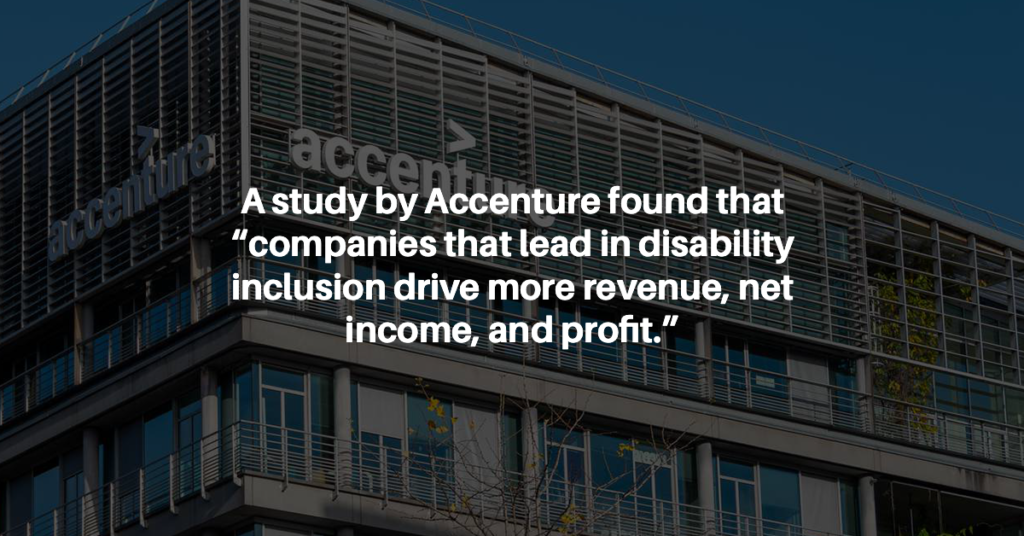
The goal of every business is to make a profit. This could come from selling products, services, brands for themselves or for someone else. As the world becomes increasingly digital the barriers for who looks like a ‘fitting’ employee and what they contribute has blurred exceedingly. Hastened by the covid 19 pandemic and the remote work boom of 2020, the idea of what an employee should look like and the work they should be doing has resulted in a lot of confusion among industry experts.
This reality has forced companies to ask the question, ‘who is an employee?’ The answer to this short question is simply, ‘anyone who can do the job’ regardless of their location, politics, ethnicity, physical condition etc., as long as they can add to the company’s bottom line, then they are fitting employees.
Which begs the question, why do companies still shy away from hiring people living with disabilities? According to the world health organization,“an estimated 1.3 billion people experience significant disability. This represents 16% of the world’s population, or 1 in 6 of us.” A major reason why companies do not hire people living with disabilities is hiring bias. This comes up as a result of hiring teams profiling based on their own biases of what the ‘ideal’ employee should like instead of what the potential employee can offer.
Two ladies may apply for the position of copywriter at an Ad company. One of the candidates may have tourettes syndrome and the other might have no significant disability. The candidate living with tourette’s syndrome may get rejected outright because of her obvious disability while the other will get hired because she fits the bill. Not entirely because she’s more qualified.
There are millions of very talented people living with disabilities in our societies. Geniuses, people of immense focus and dedication get passed on simply because they do not fit the bias of the hiring team. They work so hard to improve their craft, move past their physical and mental limitations and be the best they can be only to be passed on. It can be frustrating and extremely sad.
The Journal of Occupational Rehabilitation tells us that “the most frequently mentioned barriers are employers’ (1) expectations that people with disabilities are unproductive, (2) expectations that people with disabilities cost a lot of money, and (3) lack of knowledge about disabilities.” These barriers are problematic for companies and people with disabilities.

Benefits of hiring talents living with disability
A company that feels there’s too much risk hiring people with disabilities, coupled with mistaken assumptions about how a disabled person will fit in, closes off that organization to an extensive pipeline of talented individuals who would make their workforce more dynamic and vibrant.
Improved productivity
Employers that don’t hire people with disabilities are missing out on improved performance metrics: A study by Accenture found that “companies that lead in disability inclusion drive more revenue, net income, and profit.” So there are compelling business reasons to hire talent with disabilities.
Breaking the barriers
Companies that take the leap in hiring talents with disabilities, become pacesetters for other companies in and outside the industry. Their step towards breaking the ceiling makes them a safe space and beacon for all talents living with disability. In addition to that, they attract global talents from around the world who are looking for a place that is forward thinking and wishes to advance the culture of work.
Advanced creativity and innovations
One Of the key benefits of hiring talents with disabilities is the nuanced view they bring to ideation. Just as people from different ethnicities, backgrounds and races have unique experiences, so too do talents living with disabilities. Having their nuanced view improves the design and execution of an idea to points where no one would have conceived. This also expands the market for your product. A product that is accessible to folks with specific impairments ensures a lifetime end user for your product or service.
Lifting stigmas and changing lives
We have established at the start of this article that a major reason companies do not hire talents living with disability is simply because of their biases, which then forms stigma across different sectors asides the workplace. Breaking this stigma opens the door for more inclusive organizations and on-balance, makes the world a better place. In Africa for example, the general outlook towards people living with disability is that of disdain and disregard. This is largely because there are few healthcare, rehabilitation, and special care facilities for people living with disabilities. If they exist they are either poorly run, grossly mismanaged and lacking in maintenance. These things culminate and create an uninhabitable society for people living with disability.
How can companies join in and change this narrative?
Organizations play a large role in shaping societal views about a topic. A company that hires talents with disability not only sets the tone that, ‘disability doesn’t mean disdain’ but it also changes how the general community thinks about talent and value. We have seen talents like Stevie Wonder, Ray Charles, Cobhams Asuquo etc., change the way we view musical genius. Einstein had ADHD and was partly autistic. Stephen Hawkings had ALS for all his life and yet these two men shaped the scientific world.
When more organizations hire, accept and support talents living with disabilities they change the narrative. They break longstanding stigmas, they open previously locked doors, set society on the path of forward thinking and acceptance, and they ultimately change the lives/destiny of people who live with disability.
Conclusion
In 2024 work is being redefined. The rise of remote work provided companies with a different way to think about productivity. Now with the advancement in AI, the idea of work has hit a new curve. Companies now rely on algorithms and programs to make strategic decisions for them on a budget. These advancements open up an advantage for talents living with disabilities. For starters they can now provide value from the very comfort of their homes without the inconvenience of commuting in a society that wasn’t designed for them. AI has also advanced the human ability to learn and use tools they weren’t familiar with before, this way talents living with disabilities can have up-to-date knowledge of their interest and utilize the tools needed to constantly be productive in the ever changing workspace.



